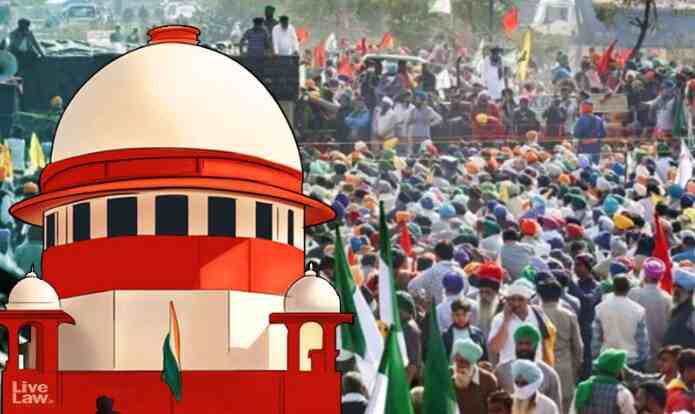The farmer’s protest 2.0 marks a significant resurgence in the agricultural community’s agitation against contentious farm laws. Farmers from Punjab, Haryana and Uttar Pradesh are marching towards Delhi in the ‘Delhi Chalo’ protest, demanding legal guarantees for the Minimum Support Price(MSP), in 2020. They protested against three laws passed by the government, at Delhi borders, leading to their repeal in 2021.
These laws were The Farmers Produce Trade and Commerce (Promotion and Facilitation), The Farmers (Empowerment and Protection) Agreement of Price Assurance and Farm Services Act, and The Essential Commodities (Amendment) Act.
Background
Building upon the momentum of the initial protests, this iteration reflects a deepening resolve and a more nuanced understanding of the issues at hand. The genesis of the Dilli Chalo March can be traced back to the passage of three contentious agricultural laws in India in September 2020. These laws were aimed at liberalizing the agricultural sector by allowing greater market participation and facilitating direct agreements between farmers and buyers.
However, they feared that these laws would dismantle the existing support mechanisms and leave them vulnerable to exploitation by large corporations. It has evolved into a multifaceted movement not only demands for the repeal of the farm laws but also broader issues such as MSP, agricultural debt, and corporatization of agriculture.
Key demands
The primary demand outlined in the farmer’s 12-point agenda is enacting a law ensuring a Minimum Support Price (MSP) for all crops, based on the recommendations of the Dr M S Swaminathan Commission’s report. According to the Swaminathan Commission report, the MSP should be set at least 50% higher than the weighted average cost of production, following the C2+50% formula.
This formula factors in the imputed cost of capital and land rent (referred to as ‘C2’) to ensure farmers receive a 50% profit margin. Some additional demands include:
- Complete forgiveness of debts for farmers and labourers;
- Enactment of the Land Acquisition Act of 2013, with provisions mandating written consent from farmers before acquisition, and compensation set at four times the collection rate;
- Justice for the perpetrators involved in the October 2021 Lakhimpur Kheri Killings;
- Withdrawal of India from the World Trade Organization (WTO) and suspension of all free trade agreements(FTAs);
- Establishments of pensions for farmers and agricultural labourers;
- Compensation for farmers who lost their lives during the 2020 Delhi protests, along with employment opportunities for one family member;
- Abandonment of the Electricity Amendment Bill 2020;
- Increase in the employment duration under MGNREGA to 200 days annually, with a daily wage of Rs 700, and integration of the scheme with agriculture;
- Implementation of strict penalties and fines for companies involved in the production of counterfeit seeds, pesticides, and fertilisers, alongside enhancements in seed quality;
- Creation of a national commission for spices like chilli and turmeric;
- Protection of the rights of indigenous people concerning water, forests, and land.
Government’s response
Following the repeal of the three farm laws in November 2021, the Indian Government announced the formation of a committee to address issues related to Minimum Support Price (MSP), promote zero-budget natural farming, and determine cropping patterns. Established in July 2022, this committee has yet to produce any findings.
In a recent meeting between Cabinet ministers and farmer union leaders, the government proposed the creation of a new committee comprising representatives from agriculture, rural, and animal husbandry ministries. This committee aims to address farmers‘ demands for MSP across all crops, with assurances from the government regarding regular meetings and adherence to a defined timeline for action.
Concerns of farmers related to WTO and FTAs
Farmers express concerns regarding WTO and FTAs primarily in four areas:
- Market Acess: They worry that these agreements open the door to increased competition for cheaper imported agricultural goods, disadvantaging local producers, especially smaller ones.
- Imported Goods: They fear that the influx of subsidized foreign agricultural products could saturate the domestic market, leading to lower prices for homegrown crops and making it challenging for them to sustain their livelihoods.
- Impact on Farming Practices: International trade agreements often impose regulations that clash with traditional farming methods, such as pesticide use, GMOs, or environmental standards, adding burden.
- Sovereignty and Autonomy: Some see withdrawal from WTO and halting FTAs as a means to regain control over India’s agricultural policies, asserting that such agreements limit the government’s ability to prioritize the needs of small-scale farmers and ensure food security.
Challenges with the legislation of MSP
Legalising Minimum Support Price (MSP) poses several challenges. Firstly, mandating the government to procure all produce at MSP could result in overproduction, leading to resource wastage and storage issues, while also potentially distorting cropping patterns and biodiversity. Moreover, it might create disparities among farmers, favouring those growing supported crops over others, thus affecting market access and government support for unsupported crops.

Private traders, benefiting from low prices during peak harvest times, resist any legal assurance of MSP. Additionally, the financial burden on the government to procure all crops at MSP could strain resources, leading to payment arrears and fiscal challenges. Finally, societal implications such as distorted cropping patterns and excessive procurement could impact food security, environment sustainability, and overall economic stability.
Initiatives to protect farmers’ income
Instead of solely relying on legalizing Minimum Support prices (MSP) to protect farmers‘ income, experts propose broader initiatives. Direct Cash transfers, like expanding the PM KISAN Scheme to encompass price support packages and fertilizer subsidies, offer stable income support. Additionally, insurance schemes can compensate for income losses due to crop failure or market fluctuations.
Supporting farmers with subsidies for inputs, technology, or diversification into high-value crops further bolsters income security. Another approach is the Price-Difference Payment option, exemplified by schemes like Haryana and Madhya Pradesh’s Bhavantar Bharpai Yojana, where they receive compensation for the gap between MSP and market rates when selling their produce.
Farm protest globally
Farmers worldwide are protesting for various reasons. In South America, grievances include unfavourable export rates, high taxes, economic downturns, and natural disasters like droughts. Brazilian farmers protest against genetically modified maize competition, while Venezuelan ones seek subsidized diesel.
In Colombia, rice growers demand higher prices. European farmers protest low crop prices, rising costs, imports, and stringent EU environmental regulations, with French ones also opposing low-cost imports and insufficient subsidies. In North and Central America, protests are for poor prices and government assistance, while in Mexico it is for corn and wheat prices and in Costa Rica for debt relief.
Conclusion
The ongoing Protest has seen active participation from various stakeholders, including farmers‘ unions, civil society organizations, and political parties. The unity across different states and regions underscores the widespread discontent and the determination to seek redress. Balancing the interests of farmers and broader economic considerations is crucial in addressing the MSP challenge.
To promote crop diversification and diminish reliance on rice and wheat, the government could progressively widen the range of crops eligible for MSP assistance. This would empower farmers with greater options and encourage cultivation aligned with market demands. Reviewing the MSP calculation methodology and ensuring transparency in its determination could ease farmers‘ concerns.
-TANYA SHAH
MUST READ: HITS AND MISSES OF UTTARAKHAND UNIFORM CIVIL CODE


